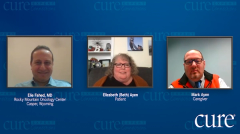
Multiple Myeloma: Resources for Patients with Financial Hardship
Beth discusses the financial hardships she experienced due to multiple myeloma and highlights sources of financial support made available to patients.
Episodes in this series

Elie Fahed, MD: Let’s talk a little about financial hardship. Having cancer at a young age is not easy. We have had tremendous progress in the treatment of multiple myeloma over the last 20 years. You are an embodiment of what the new medications can do and how they can keep patients alive. Unfortunately, they come with a high price tag. Were you able to get financial help or support? What advice can you give other patients about co-pay assistance and financial support throughout your treatment journey?
Elizabeth Ayen: When we started this, when we were so young, it was really difficult because we had to travel so much. There was not really any support. The Chamber of Commerce in Rock Springs, [Wyoming,] had a fundraiser every year, so they were able to help us a little with travel expenses, but you have to pay for gas and food. Luckily, we had family we could stay with, but it became really expensive. We got into using credit cards to pay for some of our medical bills. We had good insurance; my husband works for the state of Wyoming, but it was not like it is today. It is much better today.
Your oncology center that I go to—they do a fabulous job of trying to find whatever co-pay assistance they can find, so some of the drug companies have helped pay for anything that was not paid, like all our co-pays and our deductible and those things. For the past six years, we have had all that covered, which is amazing. Then they found that the Leukemia & Lymphoma Society also had a program that we could use. When it comes to any other costs outside like prescriptions and things like that, even our premium for our insurance—they will [cover them] up to a certain amount. That has been amazing for us.
Elie Fahed, MD: In summary, there are a lot of resources for those who know how and where to look. For patients listening today, make sure your cancer center has resources or staff dedicated to looking for co-pay assistance or foundations that can help patients with multiple myeloma. Please work with them; get that help. It will be very rewarding. Also, if you do not, do some research on your own. There are a lot of resources available for you. If you have private insurance, they have a company-directed co-pay assistance. If you do not have private insurance, there are a lot of foundations out there that can help carry part of the cost. There are a lot of direct costs—medication- and treatment-related costs, and also indirect things like lost wages, travel, and being away from home. It is not an easy situation.
Elizabeth Ayen: Right.
This transcript has been edited for clarity.
